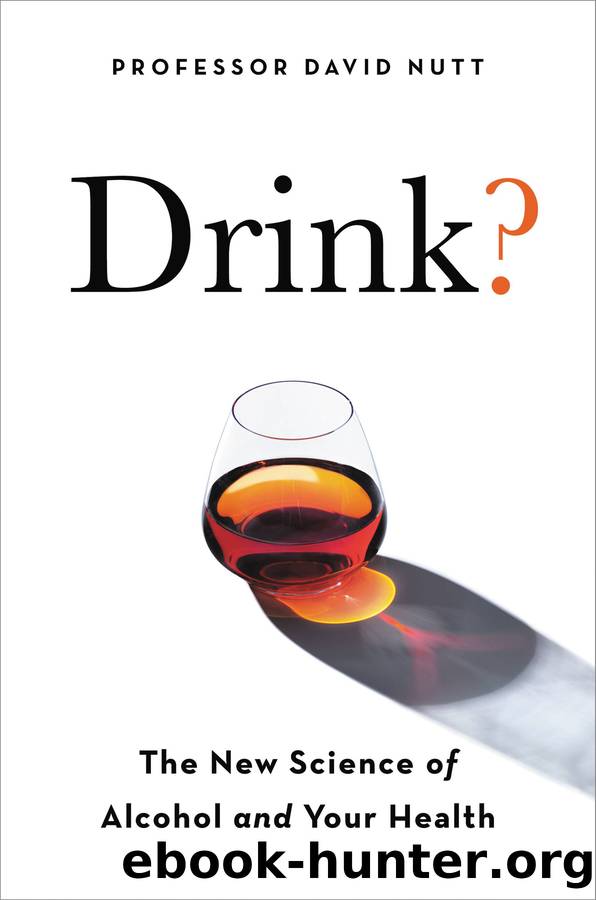Drink? by Professor David Nutt

Author:Professor David Nutt [NUTT, DAVID]
Language: eng
Format: epub
Publisher: Hachette Books
Published: 2020-12-22T00:00:00+00:00
Do you snore? If so, youâve probably been told that youâre much noisier after a drink. Snoring is a sign of the beginning of an obstruction in the air going in and out of your lungs. Drinking makes it worse because alcohol relaxes your muscles, including those of your pharynx and palate, the soft tissues at the back of your mouth and in your throat.
Snoring can develop into sleep apnea: this is where your airways collapse so you canât get any air into or out of your lungs. It deprives your brain of oxygen, a condition called hypoxia, just as if you had a plastic bag over your head.
A hypoxic episode can last 20 or 30 seconds until your brain gets so stressed that it fires off a massive fight-or-flight response. You then take an abrupt breath and your airways open for a few minutes, until you go back into a deeper level of sleep. Usually the stress response doesnât wake up the person having it, but the snoring and spluttering that accompany it can be very irritatingâand possibly worryingâto any bed partner, who may feel that the apneic person is never going to start breathing again. In my sleep clinic I would come across nondrinking partners staying awake for hours âjust in caseâ they had to revive their partner.
For many people, this pattern of hypoxia followed by a mini stress response repeats itself, sometimes hundreds of times a night. Over days and weeks, each episode adds up, which can lead to daytime sleepiness but also problems such as hypertension and obesity.
Treatment involves keeping the airways open with a Continuous Positive Airway Pressure machine (CPAP). The downside of these machines is their noise; they tend to keep the personâs poor partner awake and may be even worse than the snoring.
Both snoring and sleep apnea are more likely if youâre overweight. Thereâs a vicious circle I used to see quite often in my sleep clinic: fat men who snore and drink and keep getting fatter. Poor sleep increases ghrelin, the hormone from the stomach that increases your appetite for food and for alcohol too. It also reduces the level of the satiety hormone leptin. (Spikes in ghrelin may be partly responsible for the fact that you feel so hungry the day after drinking too.2)
Download
This site does not store any files on its server. We only index and link to content provided by other sites. Please contact the content providers to delete copyright contents if any and email us, we'll remove relevant links or contents immediately.
Professional Troublemaker by Luvvie Ajayi Jones(29648)
Whiskey Words & a Shovel I by r.h. Sin(19389)
Rewire Your Anxious Brain by Catherine M. Pittman(18642)
Healthy Aging For Dummies by Brent Agin & Sharon Perkins RN(17035)
Cat's cradle by Kurt Vonnegut(15331)
Talking to Strangers by Malcolm Gladwell(13345)
The Art of Thinking Clearly by Rolf Dobelli(10450)
They Both Die at the End by Adam Silvera(9807)
The 5 Love Languages: The Secret to Love That Lasts by Gary Chapman(9784)
Doing It: Let's Talk About Sex... by Hannah Witton(9275)
The Compound Effect by Darren Hardy(8941)
Thirteen Reasons Why by Jay Asher(8889)
Goodbye, Things by Fumio Sasaki(8575)
Wonder by R.J. Palacio(8569)
Tools of Titans by Timothy Ferriss(8363)
Atomic Habits: Tiny Changes, Remarkable Results by James Clear(8322)
Becoming Supernatural by Dr. Joe Dispenza(8199)
Wonder by R. J. Palacio(8097)
Change Your Questions, Change Your Life by Marilee Adams(7757)
